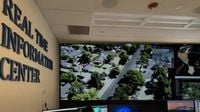In a world where retail theft is surging and technology races to keep pace, security drones are taking to the skies—and not just for police work. Flock Safety, a company once focused on law enforcement, is now offering its aviation technology to private businesses, pitching a new turnkey program called Flock Aerodome Drone as Automated Security (DAS). The idea? Lease drones, formerly used by police, to help track shoplifters and monitor sprawling properties with a level of speed and coverage that human guards simply can't match.
According to reporting by MIT Technology Review and other outlets, Flock Safety's new program puts these high-tech drones in the hands of security leaders at warehouses, rail yards, hospital campuses, ports, malls, and business parks. The drones, capable of covering a 3.5-mile radius and flying for up to 45 minutes per charge, are designed to respond rapidly to alarms and track suspects as they flee, even following vehicles with the click of a button. "Security leaders are being asked to protect more with less across bigger footprints, tighter budgets, and real staffing constraints," said Rahul Sidhu, VP of Aviation at Flock Safety. "Flock Aerodome DAS gives them a 'guard in the sky,' putting eyes on the scene in seconds and turning blind alarms into informed action."
It's a bold pitch. The drones integrate with existing alarm panels, video management systems, and access control systems—essentially becoming an automated, airborne extension of a business's security infrastructure. Keith Kauffman, a former police chief who now directs Flock's drone program, explained the system's capabilities: "The drone follows the people. The people get in a car. You click a button, and you track the vehicle with the drone, and the drone just follows the car." For businesses facing a wave of organized retail crime, it's a tempting proposition.
And the numbers are stark. Flock Safety points to a National Retail Federation report showing a 93% increase in the average number of shoplifting incidents in 2024—a statistic that has retailers and law enforcement alike searching for new solutions. With shoplifters becoming bolder and more organized, the ability to respond quickly and gather evidence has never been more critical.
But the rise of security drones isn't just a private-sector phenomenon. In Clovis, California, the police department recently launched its own Drone as First Responder (DFR) program, and it's already making headlines. As reported by KFSN, the program proved its worth in its very first week, helping officers track down and arrest a theft suspect in real time. On September 24, 2025, police were alerted to a theft at a local Walmart. A 19-year-old suspect, banned from Walmart stores across Fresno County for previous offenses, stole a bicycle and fled the store. Using their DFR system, Clovis police deployed a drone to the scene before ground units arrived. The drone quickly located the suspect riding through a parking lot and tracked his movements until officers could make the arrest. "He would have been lost if it weren't for the drone," said Clovis Police Public Information Officer Ty Wood.
The Clovis Police Department currently operates two dedicated DFR drones, each equipped with infrared imaging, zoom cameras, and sirens. Flying at about 200 feet, these drones can read license plates and capture detailed suspect descriptions, streaming live video into the department's Real Time Information Center. This center, a former conference room, now monitors 400-500 surveillance cameras throughout the city, along with the drone feeds. The department plans to add a third drone in 2026, citing improvements in response times, situational awareness, and overall public safety.
It's not hard to see why both public agencies and private companies are embracing drone technology. Drones offer a unique combination of reach, speed, and automation. They can cover vast areas, respond to alarms in seconds, and provide a bird's-eye view that would be impossible for traditional security guards. For businesses with large facilities—think distribution centers, ports, or sprawling retail complexes—the ability to monitor perimeters and track suspects in real time is a game-changer.
Yet, the rapid adoption of drones for security isn't without controversy. Privacy advocates are sounding alarms about the potential for abuse and overreach. Rebecca Williams, senior strategist for the ACLU's privacy and data governance unit, told MIT Technology Review that while Flock Safety's move into the private sector is "a logical step," it's headed "in the wrong direction." Williams and others worry that companies like Flock Safety are amassing and monetizing vast amounts of personal data, drawing comparisons to the "Meta of surveillance technology." The concern is that as drones and other surveillance tools proliferate, so too does the risk of constant monitoring and data misuse—often without the knowledge or consent of those being watched.
Flock Safety, for its part, argues that the stakes are too high to ignore. With organized retail crime on the rise, businesses face mounting losses and safety risks. The company claims its drone program not only speeds up response times but could ultimately save establishments money by deterring theft and aiding in prosecutions. The drones, they say, provide "the responsiveness of a guard, the reach of a camera network, and the speed of automation" through flight.
Still, the debate over privacy versus security is far from settled. On one hand, there's the undeniable effectiveness of drones in cases like the Clovis Walmart theft, where a suspect was apprehended thanks to real-time aerial tracking. On the other, there's the creeping sense that society is inching toward a future where every move is monitored from above, and personal data is just another commodity to be bought and sold.
As the technology improves and becomes more accessible, the questions will only grow more urgent. Will businesses and police departments strike the right balance between safety and privacy? Or will the "guard in the sky" become an ever-present reminder that, in the name of security, we're willing to trade away a little more of our anonymity?
For now, both sectors are betting that drones are the answer to a wave of retail crime that shows no sign of slowing. Whether the public agrees, and how lawmakers respond, may determine just how high these security drones will fly.




